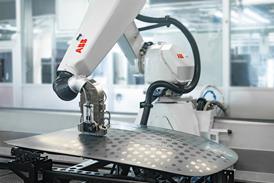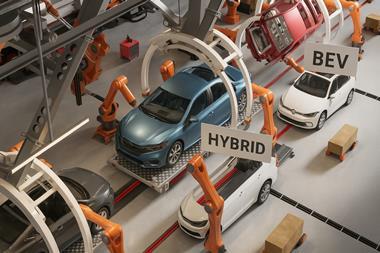
Rockwell Automation’s John Miles and Paolo Butti explain how smart manufacturing strategies can help to produce EVs quickly, affordably and with minimal risk If you’re racing to stake a claim in this fast-growing and increasingly crowded electric vehicle (EV) market, you probably have one goal: getting your EVs to market as fast as possible. However, the challenges you face and the approach you take to achieve this goal will vary depending on whether you are a young start-up or a mature, well established automaker.We know this because we’ve worked extensively with both groups of automakers. If there’s one key takeaway based on all our interactions, it’s that technology alone isn’t the answer. You need a comprehensive strategy for producing vehicles quickly, at the highest quality and with minimal risk.
If you’re racing to stake a claim in this fast-growing and increasingly crowded electric vehicle (EV) market, you probably have one goal: getting your EVs to market as fast as possible. However, the challenges you face and the approach you take to achieve this goal will vary depending on whether you are a young start-up or a mature, well established automaker.We know this because we’ve worked extensively with both groups of automakers. If there’s one key takeaway based on all our interactions, it’s that technology alone isn’t the answer. You need a comprehensive strategy for producing vehicles quickly, at the highest quality and with minimal risk.
Getting startedIf you’re a start-up, you have the considerable task of deploying production operations. Often, that involves scaling up quickly from a one-person production team with a vision to a full-fledged production facility. But such rapid rollouts can be full of challenges.We’ve seen start-ups struggle to adopt or consistently enforce automotive-production best practices. And they’ve experienced serious consequences as a result, including production delays, worker injuries and higher production costs. This is why it’s critical that you have a knowledgeable partner early in the planning process.
The right partner can give you the in-depth knowledge of automotive-production best practices and process optimisation that you need to avoid common pitfalls. They can also help you build out your automotive supply chain. For example, we’ve helped start-ups with finding the right machine and line builder partners. We’ve even created hiring guides for controls engineers, because many young companies simply don’t have deep expertise in this area and don’t know what questions to ask job candidates.
Finally, the right industry partner can help you deploy Industry 4.0 concepts. This can help you identify inefficiencies and drive continuous improvements in your operations, once they’re established. On the other end of the spectrum, if you’re a mature automaker, you are most likely hurriedly trying to catch up to the demand for EVs.
Yes, you have deep industry experience and an established global supply chain on your side. But that won’t necessarily help you accommodate the major changes that come with EVs, like new operations in battery cell, battery pack, electric motors and drivetrain, which can disrupt your operations. Preparing for these new operations takes time, manpower and money. These are a challenge when you are trying to beat your competition to market, be it another mature brand owner or an EV startup.
Embrace Industry 4.0Smart features and downloadable updates are making EVs more like consumer-electronics products. These smarter, more connected vehicles require a smarter, more connected production approach.
Many mature automakers already use connected operations but often only in limited ways or across only some of their operations. An Industry 4.0 strategy deploys seamless connectivity and data sharing, as well as industrial IoT technologies, across your entire organisation. This can help you improve visibility into production processes and help workers at every level make better and faster decisions.
For example, we’ve used smart machines to help teams create more efficient process workflows and more quickly identify the cause of stops for faster recoveries. We’ve also used advanced analytics that monitor asset data over time to help companies predict where problems may occur, so their maintenance teams can prevent stops from occurring in the first place.
Create smart and agile operationsAn integrated automation architecture facilitates smart production in a few key ways. It helps you access the right information at the right time to make operational decisions. It enables easy integration of equipment into your plant. And it allows you to more swiftly react to market demands.
So, what is an integrated architecture? It uses control and information systems that share a common network, control platform, data structures and design environment.A single network can seamlessly connect plant systems to each other and to the rest of your enterprise. A common control platform allows for more efficient installations, operations and maintenance. Common, standardised data structures make it easy to collect data across the enterprise and transform it into actionable information for better decision making. A single design environment can reduce the time and cost of designing, developing and delivering automation projects.
With this architecture in place, you can take advantage of connected technologies and capabilities that can help you produce smarter and faster. Three solutions that you should consider making part of your electric-vehicle operations include Scalable MES, Scalable Infrastructure and Independent-Cart Technology...
• Scalable MES: Individual manufacturing execution system (MES) applications can help you understand and manage production, without investing in a full MES software package. The applications address specific challenges, like quality, machine performance, or genealogy and track and trace. You can start at the machine or work-area level with a single application and minimal infrastructure requirements. You can add other applications or scale up to an integrated-MES solution as you grow production and realise ROI.
• Scalable Infrastructure: These offerings can help you converge your networks, connect your plant and business systems and give your workers access to information to make better decisions. Scalable infrastructure offerings can be especially valuable when your operations are starting small or if you have time, talent or budgetary constraints. Infrastructure-as-a-service (IaaS), for example, can reduce the burden of designing, deploying and maintaining a network infrastructure. It also can shift your network’s costs from a capital expense to an operating expense.IaaS combines pre-engineered network solutions, on-site configuration and 24/7 remote monitoring into a single contract. The offerings use best-in-class technologies and architectures and can help you optimise the performance, efficiency and uptime of your network architecture.
• Independent Cart Technology: Systems built with this technology will be a game changer in electric-vehicle production. They offer the potential of higher line speeds and reduced downtime, both of which can help you get to market faster. Independent-cart technology allows a brand owner to move small components, or even full car bodies, around a plant faster and more precisely than conventional mechanical solutions. This can help you speed up production in a traditional body shop or in areas like battery cell and pack production, where high-speed conveyance has proven to be a challenge. You can change the functions of systems using independent-cart technology with the push of a button to achieve fast changeovers. These systems also have fewer moving parts, which can reduce your maintenance needs, improving uptime.
Start with a strategyThe EV market is only going to get hotter as more automakers try to carve out a piece of it. The right expertise, partners and technologies are all essential to your success. More important is having a well-thought-out strategy that addresses the unique challenges of electric-vehicle production and defines how Industry 4.0 concepts will help you solve them.
Authors: John Miles is global business leader for electric vehicles and Paolo Butti is industry manager for automotive and tire at Rockwell Automation









































